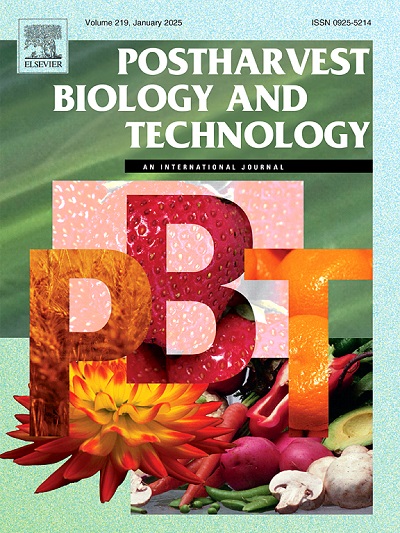茉莉酸信号通路通过ppmyc2激活PpPGIP1的转录参与琼脂寡糖诱导桃果的抗病性
IF 6.8
1区 农林科学
Q1 AGRONOMY
引用次数: 0
摘要
琼脂寡糖(AO)能增强桃果对木门菌的抗性,减少采后腐烂,但其分子机制尚不清楚。本研究通过转录组分析和RT-qPCR分析发现,AO激活了茉莉酸(jasmonic acid, JA)合成相关基因(PpLOX5-1 / PpLOX5-2 /PpAOC/PpAOS/PpOPR2)和信号转导相关基因(PpMYC2/PpJAZ5)的表达,同时JA含量升高。此外,AO显著上调了参与植物与病原体相互作用的多半乳糖醛酸酶抑制蛋白1 (PpPGIP1)基因的表达。酵母单杂交实验和电泳迁移率转移实验显示PpMYC2通过G-box元件与PpPGIP1启动子结合。烟草双荧光素酶报告基因实验以及PpMYC2在桃果中的过表达和沉默均表明PpMYC2正调控PpPGIP1的表达。综上所述,我们的研究结果表明,AO激活JA合成和信号转导,随后触发PpMYC2正向调节PpPGIP1的表达,从而增强桃果对果霉感染的抗性。本文章由计算机程序翻译,如有差异,请以英文原文为准。
Jasmonic acid signaling pathway is involved in agaro-oligosaccharides-induced disease resistance of peach fruit through PpMYC2-activated transcription of PpPGIP1
Agaro-oligosaccharides (AO) can enhance peach fruit resistance to Monilinia fructicola and reduce postharvest decay, but its molecular mechanism is unclear. In this study, transcriptome analysis and RT-qPCR analysis revealed that AO activated the expression of genes associated with jasmonic acid (JA) synthesis (PpLOX5–1/PpLOX5–2/PpAOC/PpAOS/PpOPR2) and signal transduction (PpMYC2/PpJAZ5), along with a rise in JA content. Additionally, AO significantly up-regulated the expression of the gene encoding polygalacturonase-inhibiting protein 1 (PpPGIP1) participating in plant-pathogen interaction. Yeast one-hybrid assay and electrophoretic mobility shift assay revealed that PpMYC2 bound to the PpPGIP1 promoter through the G-box element. Dual luciferase reporter assay in tobacco, as well as transient overexpression and silencing of PpMYC2 in peach fruit, demonstrated that PpMYC2 positively regulated PpPGIP1 expression. In summary, our findings indicated that AO activated JA synthesis and signal transduction, subsequently triggering PpMYC2 to positively regulate PpPGIP1 expression, thereby boosting the resistance of peach fruit to M. fructicola infection.
求助全文
通过发布文献求助,成功后即可免费获取论文全文。
去求助
来源期刊

Postharvest Biology and Technology
农林科学-农艺学
CiteScore
12.00
自引率
11.40%
发文量
309
审稿时长
38 days
期刊介绍:
The journal is devoted exclusively to the publication of original papers, review articles and frontiers articles on biological and technological postharvest research. This includes the areas of postharvest storage, treatments and underpinning mechanisms, quality evaluation, packaging, handling and distribution of fresh horticultural crops including fruit, vegetables, flowers and nuts, but excluding grains, seeds and forages.
Papers reporting novel insights from fundamental and interdisciplinary research will be particularly encouraged. These disciplines include systems biology, bioinformatics, entomology, plant physiology, plant pathology, (bio)chemistry, engineering, modelling, and technologies for nondestructive testing.
Manuscripts on fresh food crops that will be further processed after postharvest storage, or on food processes beyond refrigeration, packaging and minimal processing will not be considered.
 求助内容:
求助内容: 应助结果提醒方式:
应助结果提醒方式:


